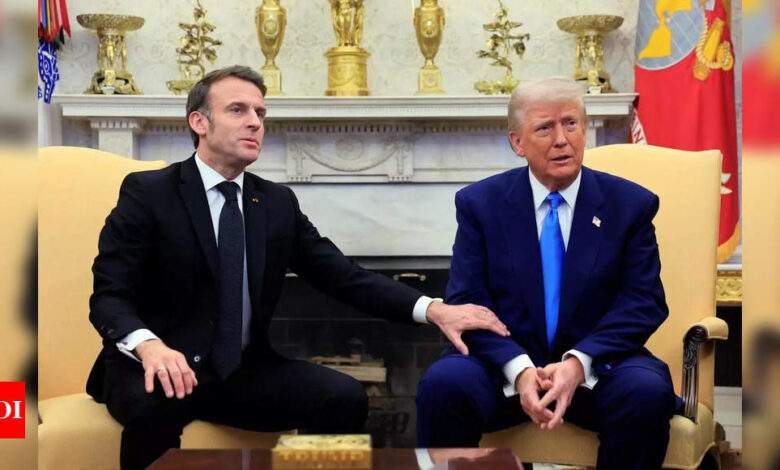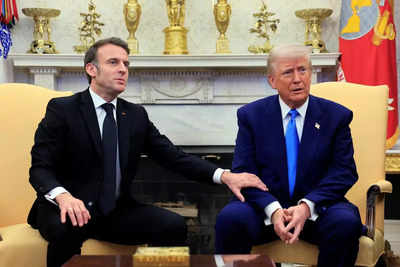Europe vs US? Macron slams Trump’s Ukraine narrative: ‘We put in real money’

In a high-profile diplomatic clash, French President Emmanuel Macron publicly contradicted US President Donald Trump on Ukraine, underscoring the widening transatlantic divide over the war. While both leaders sought to maintain a friendly facade during their White House meeting, their sharp differences on the conflict exposed deeper tensions between the United States and its European allies.
Public disagreement on aid to Ukraine
During a joint press conference, Trump claimed that Europe was merely lending money to Ukraine and would eventually recoup its investments. Macron wasted no time correcting him.
“No, in fact, to be frank, we paid — we paid 60 percent of the total effort,” Macron said, leaning in slightly and placing his hand on Trump’s arm. “Like the US, we provided real money through loans, guarantees, and grants.”
Trump, ever the showman, smirked and waved off Macron’s remarks, signaling his skepticism. “If you believe that, it’s OK with me,” he quipped. But the exchange highlighted a broader rift: Europe sees its aid as a fundamental commitment to Ukrainian sovereignty, while Trump frames it as a questionable investment.
Clashing views on war and peace
The disagreement didn’t stop there. Trump, who has long claimed he could end the war “within 24 hours” if given the chance, reiterated his belief that negotiations with Russian President Vladimir Putin were yielding results.
“We’ve had some very good talks with Russia,” Trump said. “We’re trying to get this war ended with Russia and Ukraine.”
Macron, however, pushed back. “This peace must not mean a surrender of Ukraine,” he stated firmly. “It must not mean a cease-fire without guarantees. This peace must allow for Ukrainian sovereignty.”
His words stood in direct contrast to Trump’s transactional approach, which includes demands that Ukraine hand over mineral rights as compensation for US aid—a proposal that Ukrainian President Volodymyr Zelensky has resisted.
Trump’s controversial stance on Russia
Trump’s posture toward Russia has raised eyebrows among European leaders. While European landmarks, from the Eiffel Tower to the Brandenburg Gate, lit up in Ukraine’s blue and yellow colors to mark the war’s third anniversary, the White House made no such gesture of solidarity.
More strikingly, at the United Nations, the US found itself in an uncomfortable camp with Russia, North Korea, and Belarus in opposing a resolution condemning Russian aggression—an alignment that would have been unthinkable under past administrations.
Adding to the controversy, Trump declined to call Putin a dictator, a stark departure from Macron’s unambiguous stance. “I don’t use those words lightly,” Trump said when asked.
Macron, in contrast, was clear. “This is a responsibility of Russia because the aggressor is Russia,” he declared.
Europe’s strategy to navigate Trump’s America
The Trump-Macron meeting came as European leaders scrambled to recalibrate their relationship with Washington. Macron has convened meetings of European leaders to discuss how to handle an America that appears to be shifting its priorities away from traditional allies. Meanwhile, Polish President Andrzej Duda and British Prime Minister Keir Starmer are making their own trips to Washington, hoping to influence Trump’s policies.
Even Macron’s visit was seen as part of this strategic outreach, as he sought to reinforce France’s role as a key negotiator in any potential Ukraine settlement.
The personal dynamic: A testy friendship
Despite their disagreements, Trump and Macron put on a show of camaraderie. The two leaders engaged in their signature handshake battles—firm, prolonged, and symbolic of their underlying power struggle. At one point, Macron even hugged Trump, a gesture both affectionate and strategic.
But the differences remain stark. Macron has largely cut off direct communication with Putin since the 2022 Bucha massacre, while Trump is openly entertaining diplomatic talks with Moscow. As Trump floats the idea of a potential visit to Russia—a move that would make him the first US president in over a decade to do so—Macron and other European leaders watch nervously.
What’s next?
While Trump continues to tease a rapid resolution to the war, the details remain murky. His insistence that Ukraine cede resources in exchange for aid is unlikely to gain traction among European allies or in Kyiv. Meanwhile, Macron and other European leaders will likely double down on their support for Ukraine, setting the stage for further transatlantic friction.
As the US and Europe navigate these growing tensions, one thing is clear: Macron is not backing down, and Trump remains as unpredictable as ever. The question now is whether their diplomatic dance will lead to a coordinated strategy or further deepen the divide.
https://static.toiimg.com/thumb/msid-118562851,width-1070,height-580,imgsize-85410,resizemode-75,overlay-toi_sw,pt-32,y_pad-40/photo.jpg
2025-02-25 09:56:09





